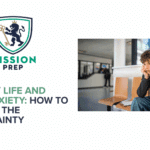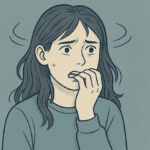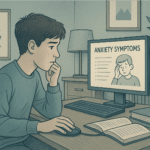Best Anti-Anxiety Medications for Teens

Anxiety can feel overwhelming, scary, and like you’re losing control. For parents, watching a teen cope with chronic anxiety and overthinking can be difficult to see – leading some to wonder what the best anti-anxiety medications for teenagers are.
Anxiety is a common problem, impacting over 31% of teens.1 Fortunately, as scary as it is, anxiety is very treatable with the help of lifestyle changes, therapy, and, of course, medications. Some of the best anti-anxiety medications for teenagers include drugs known as SSRIs, SNRIs, and other options like benzodiazepines.
Managing anxiety in teenagers with medication doesn’t have to be stressful or overwhelming. With the right approach and support, it can make a huge impact on their mental health and overall well-being. However, medication should never be considered lightly – there’s always a risk of side effects and they don’t get to the root cause of the problem.
Mission Prep can advise you and your child on the best ways to manage anxiety for their needs. This article can also help by breaking down…
How anti-anxiety medications work for teens
- What the options for anxiety medications are and how they work
- The safest anxiety medications for young people
- Potential side effects of anti-anxiety medications for adolescents
- Where to find professional support for teen treatment with anti-anxiety medications

Do I Need Medication for My Anxiety?
Anxiety is a common mental health problem that impacts both teens and adults alike. There are many different signs of anxiety, including:2
Feelings of worry or unease
- Restlessness
- Difficulty concentrating
- Fatigue
- Trouble sleeping
- Irritability
- Muscle tension
- Stomach aches
- Fast heartbeat
- Sweating
- Shortness of breath
These symptoms can have a significant impact on a teen’s daily life, making it difficult to focus in school, maintain relationships, and participate in activities they once enjoyed. While there are many different treatment options for anxiety, including therapy and lifestyle changes, you may have been asking yourself, “Do I need medication for my anxiety?”
Medication is sometimes recommended for anxiety that doesn’t seem to go away with these changes. Deciding whether or not to take medication for anxiety can be a tough decision for both teens and their parents. It’s important to talk with your healthcare provider about your concerns and any potential side effects of anti-anxiety medications for adolescents. They can work with you to determine if medication is the right course of treatment for your child and which type could work best.
How Do Anti-Anxiety Medications Work?
If your doctor recommends taking meds, you might be wondering how anti-anxiety medications work for teens. However, no two medications work the same way for everyone. Plus, there are many different kinds of anti-anxiety medications, including SSRIs, SNRIs, benzodiazepines, and beta blockers. Each of these work to manage anxiety in slightly different ways, which the following information covers.
Selective serotonin reuptake inhibitors (SSRIs): SSRIs are commonly used for treating anxiety disorders in children and teens. These medications work by altering the levels of the chemical serotonin in the brain. Serotonin controls things like mood, sleep, and other bodily functions.
- Serotonin-norepinephrine reuptake inhibitors (SNRIs): These drugs are also commonly used for treating anxiety disorders in children and teens. They work by increasing both serotonin and norepinephrine in the brain. Norepinephrine is a neurotransmitter that helps control how someone responds to stress.
- Benzodiazepines: These work by enhancing the effects of GABA (gamma-aminobutyric acid), a neurotransmitter that helps to slow down brain activity and gives people feelings of relaxation.3 They’re also known as “benzos” or BZDs, and can be addictive, which is why they’re usually only prescribed for a couple of weeks.
- Beta Blockers: These drugs help reduce the physical symptoms of anxiety, such as increased heart rate.4 They can also be prescribed for heart palpitations or high blood pressure.
While each medication works differently on the brain and body, they can all be suitable options for teens with anxiety. However, only a conversation and evaluation with a doctor or mental health provider can uncover which could work best for a teen.
It’s also important to know that while anti-anxiety medications for generalized anxiety in teens can be helpful, they are not a long-term solution on their own. These medications should be used in combination with therapy and other coping strategies to help a teen fully heal from and live with anxiety.
What Is the Best Medication for Anxiety and Overthinking?
There really isn’t a “one-size-fits-all” anti-anxiety drug. No two people react the same way to the same medication. Teen mental health treatment with anti-anxiety drugs requires a lot of interaction between teens, parents, and healthcare providers. Yet, there are certain medications that are commonly prescribed for anxiety more so than others.
For instance, SSRIs and SNRIs are considered to be “first line” medications for anxiety. However, fast-acting anti-anxiety medications like benzodiazepines (such as Ativan) or buspirone may also be prescribed depending on the situation.5
Each of these medications, in addition to therapy, can be useful in reducing anxiety symptoms in teens. Let’s take a deeper dive into these medications and how they differ from one another.
Selective Serotonin Reuptake Inhibitors (SSRIs)
SSRIs are often the first line of defense when it comes to teen treatment with anti-anxiety medications. They’re not addictive, are well-tolerated, and have been studied in depth.6 This makes them great options for teens and adults coping with anxiety disorders.
Common SSRIs Prescribed to Teens:
While all SSRIs work similarly in the brain, they still vary somewhat. Some of the most commonly prescribed SSRIs for teens include:
Fluoxetine (Prozac):Prozac is approved for treating both depression and anxiety in children 8 years and older.7
- Sertraline (Zoloft): Zoloft is one of the most common anti-anxiety medications for teens with social anxiety, panic disorders, and generalized anxiety disorder (GAD).8
- Escitalopram (Lexapro): Lexapro is effective for teen anxiety and is approved for ages 12 and up.9
While SSRIs are usually well tolerated, they do come with potential side effects of anti-anxiety medications for adolescents, including:10
Nausea or upset stomach
- Fatigue or drowsiness
- Restlessness or insomnia
- Weight changes
- Increase in anxiety symptoms during the first weeks
There’s no way to know how certain SSRIs will affect your child, so your provider will want to work with your teen to know how SSRIs are affecting them. Some people, for instance, might have more upset stomach issues than others. Additionally, your teen might react better to Zoloft than they do Prozac. Anti-anxiety medications and sleep issues in teens have also been reported, with SSRIs like Lexapro sometimes causing insomnia.11
It might also take several trials before your child finds the right anti-anxiety medication that works for them. Whether it’s anxiety medication for teens with ADHD, combining other medication with anti-anxiety medication, or simply exploring options for managing anxiety, it’s important to communicate openly with your provider.
Serotonin-Norepinephrine Reuptake Inhibitors (SNRIs)
Unlike SSRIs that focus on serotonin alone, SNRIs target both serotonin and norepinephrine. This can make SNRIs a better option for teens who don’t respond to SSRIs.
For instance, SNRIs may be prescribed when SSRIs don’t make a big impact on anxiety or depression, or when a doctor decides that dual-action medication could be a better approach. Common SNRIs include:
Venlafaxine (Effexor XR): This can be used for general anxiety, but needs to be closely monitored due to its more intense withdrawal symptoms.12
- Duloxetine (Cymbalta): Known to treat both anxiety and physical symptoms linked to anxiety conditions, like headaches or muscle pain.13
If you’re worried about anti-anxiety medication withdrawal symptoms in teens, it’s important to know that SNRIs do tend to come with more side effects than SSRIs. These include potential withdrawal symptoms like nausea, insomnia, and even high blood pressure.14
It’s never a good idea to suddenly stop taking any type of medication without telling your doctor first. This is especially true for anti-anxiety medications like SNRIs, since abruptly stopping them can lead to negative effects and potentially make your symptoms of anxiety worse.15 The safe use of anti-anxiety medications in teens often involves gradually tapering off to minimize withdrawal symptoms.
Benzodiazepines
Some common benzodiazepines include:
Alprazolam (Xanax): Used specifically for panic disorder, Xanax acts quickly but may also lead to dependence.16- Diazepam (Valium): Useful for generalized anxiety disorder and phobias, it has a longer half-life than other drugs, meaning it stays in the body longer.17
- Lorazepam (Ativan): Commonly used for generalized anxiety disorder and also seizures.18
- Clonazepam (Klonopin): Also used for panic disorders, it has a longer half-life and may be prescribed for severe anxiety.19
While BZDs can help with anxiety disorders, they do come with potential side effects like drowsiness, dizziness, and impaired coordination.20 They can also lead to addiction and stopping them quickly can lead to serious issues like seizures.21
For this reason, BZDs as anti-anxiety medications for teen panic attacks or similar issues are only prescribed for short-term use or as needed in emergency situations. It’s important to follow your doctor’s instructions and not to exceed the recommended dosage.
It can be hard to find ways to cope with anxiety symptoms and panic attacks on your own. That’s why it’s so important to get professional help whether you’re dealing with generalized anxiety, panic attacks, panic disorder, and anything in between.
What Is the Safest Anxiety Medication for Children?
SSRIs are also commonly used as depression medications, so if a teen has both anxiety and depression they can be a good option. Of course, SSRIs, like other medications, still have some risks you need to be aware of.
Side Effects of Anti-Anxiety Medications for Adolescents: Important Considerations and Precautions
Black Box Warnings:
For parents and teens, it’s important to be honest with your doctor and report any suicidal thoughts. Doing so might be scary, but it can help determine if medications such as SSRIs are right for you and could even save your child’s life.
Regular Monitoring and Check-ups:
SSRIs, SNRIs, BZDs, and other medications should never be prescribed and forgotten about. Your provider will need to continue to check on your child’s feelings, continue treatment like therapy, and adjust dosage as required. This way, a teen will continue to benefit from treatment while minimizing side effects.
Your child won’t have to take medications forever if they don’t need or want to. But, they will need to learn to manage anxiety attacks and stress and get to the root of their issues.
Mission Prep: A Balanced Approach to Managing Teen Anxiety
Anxiety doesn’t have to define your teen’s life. With the right support, tools, and treatments, they can learn to thrive. At Mission Prep, residential and outpatient mental health recovery for teens with anxiety is available.
Our goal is to use evidence-based treatments like CBT and EMDR therapy alongside medication management to help teens overcome their anxiety and build resilience. If you’re looking for high-quality anxiety treatment for teens in California and Virginia, or telehealth options, call us today to schedule an appointment. We’re excited to work with you and your teen on their journey to mental wellness.

References
- National Institute of Mental Health. (n.d.). Any anxiety disorder. https://www.nimh.nih.gov/health/statistics/any-anxiety-disorder
- World Health Organization. (2023, September 27). Anxiety disorders. https://www.who.int/news-room/fact-sheets/detail/anxiety-disorders
- Bounds, C. G., & Patel, P. (2024, January 30). Benzodiazepines. In StatPearls. StatPearls Publishing. https://www.ncbi.nlm.nih.gov/books/NBK470159/
- Farzam, K., & Jan, A. (2023, August 22). Beta blockers. In StatPearls. StatPearls Publishing. https://www.ncbi.nlm.nih.gov/books/NBK532906/
- Wilson, T. K., & Tripp, J. (2023, January 17). Buspirone. In StatPearls. StatPearls Publishing. https://www.ncbi.nlm.nih.gov/books/NBK531477/
- NHS. (2025, May 2). Overview – Selective serotonin reuptake inhibitors (SSRIs). https://www.nhs.uk/mental-health/talking-therapies-medicine-treatments/medicines-and-psychiatry/ssri-antidepressants/overview/
- NHS. (2022, February 15). Who can and cannot take fluoxetine. https://www.nhs.uk/medicines/fluoxetine-prozac/who-can-and-cannot-take-fluoxetine/
- Allgulander, C., Dahl, A. A., Austin, C., Morris, P. L., Sogaard, J. A., Fayyad, R., Kutcher, S. P., & Clary, C. M. (2004). Efficacy of sertraline in a 12-week trial for generalized anxiety disorder. American Journal of Psychiatry, 161(9), 1642–1649. https://doi.org/10.1176/appi.ajp.161.9.1642
- MedlinePlus. (n.d.). Escitalopram: MedlinePlus drug information. https://medlineplus.gov/druginfo/meds/a603005.html
- Ferguson, J. M. (2001). SSRI antidepressant medications: Adverse effects and tolerability. Primary Care Companion to the Journal of Clinical Psychiatry, 3(1), 22–27. https://doi.org/10.4088/pcc.v03n0105
- Campagne, D. M. (2005, July 6). Venlafaxine and serious withdrawal symptoms: Warning to drivers. BMJ, 331(7509), 44. https://pmc.ncbi.nlm.nih.gov/articles/PMC1681629/
- Skljarevski, V., Zhang, S., Iyengar, S., D’Souza, D., Alaka, K., Chappell, A., & Wernicke, J. (2011). Efficacy of duloxetine in patients with chronic pain conditions. Current Drug Therapy, 6(4), 296–303. https://doi.org/10.2174/157488511798109592
- Zhong, Z., Wang, L., Wen, X., Liu, Y., Fan, Y., & Liu, Z. (2017). A meta-analysis of effects of selective serotonin reuptake inhibitors on blood pressure in depression treatment: Outcomes from placebo and serotonin and noradrenaline reuptake inhibitor controlled trials. Neuropsychiatric Disease and Treatment, 13, 2781–2796. https://doi.org/10.2147/NDT.S141832
- George, T. T., & Tripp, J. (2023, April 24). Alprazolam. In StatPearls. StatPearls Publishing. https://www.ncbi.nlm.nih.gov/books/NBK538165/
- Dhaliwal, J. S., Rosani, A., & Saadabadi, A. (2023, August 28). Diazepam. In StatPearls. StatPearls Publishing. https://www.ncbi.nlm.nih.gov/books/NBK537022/
- CURE Epilepsy. (2024, November 5). Lorazepam (Ativan) – Epilepsy medication. https://www.cureepilepsy.org/understanding-epilepsy/treatments/epilepsy-medications/lorazepam/
- National Alliance on Mental Illness. (2024, December 23). Clonazepam (Klonopin) | NAMI. https://www.nami.org/about-mental-illness/treatments/mental-health-medications/types-of-medication/clonazepam-klonopin/
- Griffin, C. E., III, Kaye, A. M., Bueno, F. R., & Kaye, A. D. (n.d.). Benzodiazepine pharmacology and central nervous system–mediated effects. The Ochsner Journal, 13(2), 214–223. https://pmc.ncbi.nlm.nih.gov/articles/PMC3684331/
- Pétursson, H. (1994). The benzodiazepine withdrawal syndrome. Addiction, 89(11), 1455–1459. https://doi.org/10.1111/j.1360-0443.1994.tb03743.x
- Dwyer, J. B., & Bloch, M. H. (2019, September 1). Antidepressants for pediatric patients. https://pmc.ncbi.nlm.nih.gov/articles/PMC6738970/
- Center for Drug Evaluation and Research. (2018, February 5). Suicidality in children and adolescents being treated with antidepressant medications. U.S. Food and Drug Administration. https://www.fda.gov/drugs/postmarket-drug-safety-information-patients-and-providers/suicidality-children-and-adolescents-being-treated-antidepressant-medications



















